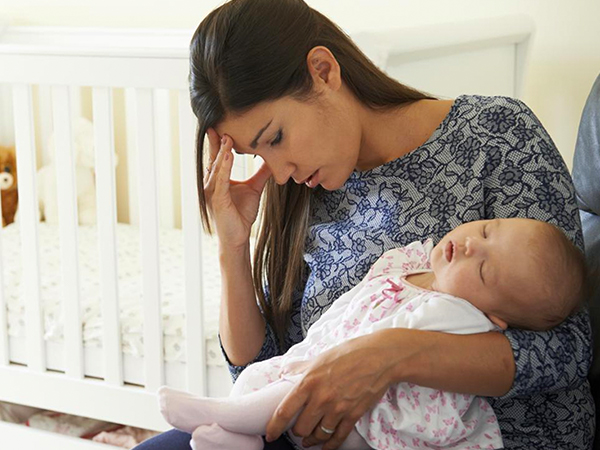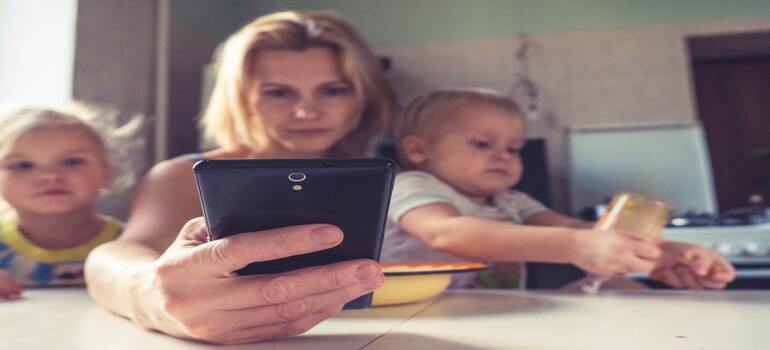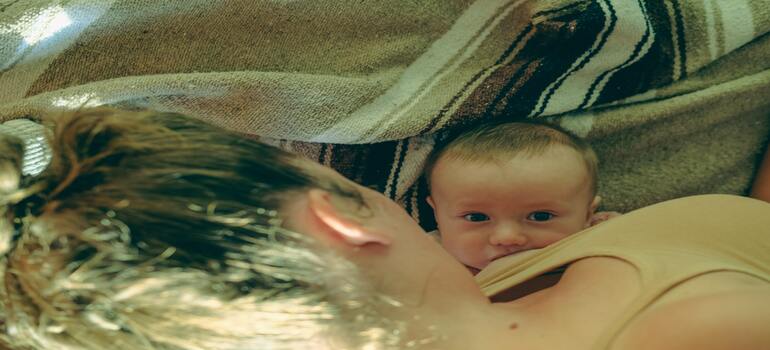What is Postpartum Depression and how long does it last?

- April 26, 2021
- MKB Team
The Postpartum phase involves mood swings, crying and irritability. When you give birth, your body undergoes strange hormonal adjustments.
During the initial period this can cause stress, sadness and anxiety to a woman and this is also known as ‘baby blues’. Thankfully, this phase fades away in a week or two after delivery. But new moms struggling with postpartum problems that last beyond this two week period might be experiencing a more severe symptom called PPD or postpartum depression. This condition needs immediate medical supervision. PPD can linger on for months or even years if neglected and is not something that will just disappear like the ‘baby blues’.
What is postpartum depression?
Postpartum depression or PPD is a type of clinical depression usually in a woman that surfaces after she gives birth to a baby. The common symptoms are:
- Loss of appetite.
- Excessive crying or fatigue.
- Difficulty to bond with baby.
- Restlessness and insomnia.
- Anxiety and panic attacks.
- Feeling angry, hopeless, or shameful.
What causes PPD?
It is not certain what exactly causes PPD, but just like any other form of depression, it’s likely to be caused by many different things. A woman is especially vulnerable during the postpartum phase with biological changes, severe stress and major life changes all tend to happen simultaneously. These are all the common causes of clinical depression. The following reasons could also cause PPD after you give birth:
- You don’t get enough sleep.
- Your body begins to cope with major hormone fluctuations.
- You gradually recover from the rigorous physical event of giving birth, which might have exposed you to continuous medical examinations, interventions or surgery.
- You are faced with new and challenging responsibilities to handle the baby.
- There might be feelings of disappointment over your labor and delivery.
- You might be experiencing feelings of sadness, loneliness, isolation, disappointment and confusion.
Is postpartum depression applicable only for women with babies?
‘’Postpartum’ essentially means returning to a state where a woman is not-pregnant. However, this term is also applicable for those women who have had an abortion or a miscarriage. These women might also experience the mental and physical repercussions of being in the postpartum stage, and that includes PPD.
Are only women diagnosed with PPD?
Surprisingly, even male partners can be diagnosed with PPD. While they do not experience the physical changes that are brought after giving birth, they are actually affected by the changes in lifestyle as new parents. A 2010 study indicated that approximately 10 percent of new dads are diagnosed with PPD, usually between 3 and 6 months after birth.
When does postpartum depression typically start?
PPD can begin immediately after you give birth. But realization may creep in later as it is thought normal to feel sad, tired, and generally “out of sorts” immediately after baby arrives. Sometimes, PPD can also develop while you are pregnant and up to 1 year after giving birth.
How long does PPD normally last?
As PPD can appear anywhere from a few weeks to a year after birth, one cannot specify an average time for it to last. Studies indicate that PPD symptoms improve gradually over time, with many cases of depression being cured 3 to 6 months after they began. But the PPD timeline is different for everyone and even with treatment, PPD might last longer sometimes. This basically depends on how severe the symptoms are when treatment was begun.
What are the risk factors?
Risk factors include:
- A history of depression or other mental illness.
- Breastfeeding difficulties.
- A complicated pregnancy or delivery.
- Lack of support from your partner or family members and friends.
- Other major life changes occurring during the postpartum period, like a move or loss of employment.
- A history of PPD after a previous pregnancy.
When should you seek medical help?
Get in touch with your doctor if you aren’t feeling better after 2 weeks of postpartum. That means it’s not just the ‘baby blues’. But it’s also good news because that means its early detection and faster treatment. Be absolutely honest when you seek help from your doctor and there’s no need to hide anything as PPD is something that could harm your relationship without your fault.
How to combat PPD?
- SSRI: Your doctor might prescribe a SSRI or a selective serotonin reuptake inhibitor to treat your depression. Your doctor will decide which SSRI is best suited for you according to your symptoms.
- Counselling: CBT or Cognitive behavioural therapy is an effective strategy to treat depression, including PPD.
- Group Therapy: It might be beneficial to engage in group therapy to share experiences with other parents who’ve had PPD. Discovering a support group, even online, can be a godsend.
Depression affects your body as well as your brain. Communicate with your partner even if the going is difficult as he or she is the only one who can extend that much needed support. Reach out to a healthcare provider as the sooner you are treated, the better!
Was this article helpful for you? Do let us know your suggestions, tips and feedback. We’d love to address any questions you might have in our Q&A session.
Q&A
You ask and we answer!
How long are you considered postpartum?
Alice Dunne, Dehradun.
The first six weeks after giving birth are known as the postpartum period. This period is an intense time that requires all sorts of care for you and your baby.
How long do postpartum hormones last?
Leela Bhandari, New Delhi.
Typically, symptoms related to hormone imbalance should only be prevalent for a few weeks after delivery usually about 6 to 8 weeks. Symptoms related to hormones while breastfeeding will remain in the body for as long as a woman breastfeeds.
What causes postpartum?
Rukmini Natarajan, Chennai.
After childbirth, a dramatic drop in hormones (estrogen and progesterone) in your body may contribute to postpartum depression. Other hormones produced by your thyroid gland also may drop sharply, leaving you tired, sluggish and depressed.
Published by
MKB Team
200 Articles
MomsKnowBest is a fast-growing vibrant community of moms, for moms, by moms. Motherhood is complex fun, fulfilling, grueling, exhausting and very complex. There’s no handbook to it. And let’s face it – moms are put...
Read MoreShare with your friends!
Leave a Comment
Trending Post
Myth Buster: Having iron tablets makes your child...
Busting Top 10 Pregnancy Myths about having Iron Tablets
One of the Top 10 pregnancy myths is that...
Health Benefits of Pomelo For Moms To-Be & Kids
During pregnancy, women need proper nutrition to support their health as well as the growth of the...



